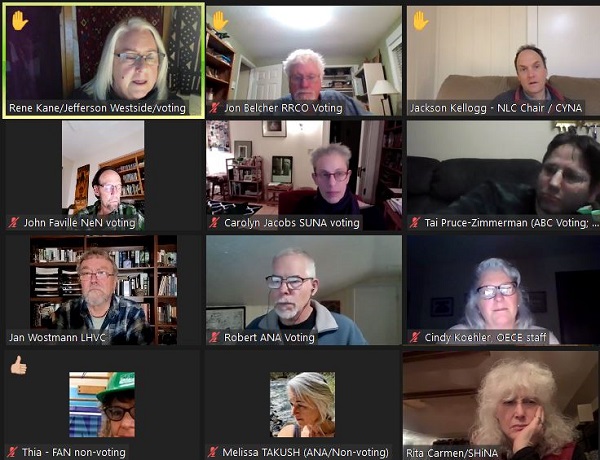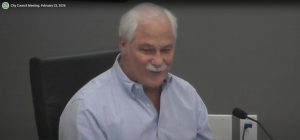With budget cuts looming, neighborhoods look for bigger role in community engagement
8 min read
With the city moving to its first priority-based budget while also cutting that budget by at least 10 percent, neighborhood leaders volunteer hundreds of hours to state their case: Eugene’s neighborhood organizations are essential for public participation.
[00:00:12] Cindy Koehler (City of Eugene): Our program, the neighborhood program is expensive. Straight up. It’s an expensive program and we want to make sure that the program aligns with council goals and ensure that it remains funded. So we need to get on their agenda, demonstrate the value of the whole program, and make sure that we continue to get funded.
[00:00:38] The budget committee and mayor and council need to be convinced that the neighborhoods program is a valuable, viable program that is consistent with what the community wants and where community values are.
[00:00:49] In the past, the city has sort of siloed their community outreach. So planning and development has their own outreach. The police department has their own outreach. And everybody does it differently.
[00:01:00] And the organization is shifting to having community outreach actually be community outreach and use a model that reaches broader community and allows for broad participation, not the handpicked participation that maybe some teams do, maybe they don’t. I don’t know. I’m not going to weigh in on that. But it’s so all that goes through us and the neighborhoods are a huge piece of that community engagement. Huge piece.
[00:01:28] Tai Pruce-Zimmerman (Active Bethel Community): There’s just a huge amount of uncertainty about what this new budget process is going to look like, so I can understand where that uncertainty can create a lot of anxiety and confusion for any city staff and any department on what exactly needs to be done to be justified.
[00:01:52] And on top of all of that, I also do know that our financial outlook is very poor right now. The last figure I recall hearing in a public meeting was something in the range of, we’re going to need to cut like 10%. And I have privately heard that it might be more than that even with the latest updates that haven’t gone public yet.
[00:02:23] So yeah, it’s looking like we’re going to be simultaneously needing to have significant cuts and reevaluating every single program in the city as part of the transition to the new process. So that combination creates a uniquely challenging position even for programs that are historically deeply entrenched.
[00:02:48] So it’s definitely, I can confirm, it’s a very tumultuous time for every program. And so if there was ever a time to be as much having your best foot forward and as possible and for a program that we all consider as important as the neighborhood program, certainly, we definitely want to present it in a way that make that really as much as humanly possible emphasizes its importance and its value, and that certainly it functions in an equitable way that benefits the community at large, everyone in the community.
[00:03:28] And I think we have the arguments for it, but we want to make sure we’re making them as clearly as we possibly can.
[00:03:33] John Q: At the NLC meeting Nov. 29, a discussion of how a new Neighborhood Organization Recognition Policy—the NORP— can help.
[00:03:43] Cindy Koehler: At the last budget review, there were a few departments and a few areas in the city, which are also very important, that didn’t quite make the test for funding. So a lot of different departments are scrambling to go back to like the mission statement and the value statement and trying to make sure that they are in line with that.
[00:04:03] And having the NORP and having a way to capture that value will help all of us. So that’s really my goal with the NORP. I want to make sure that the neighborhoods remain formally recognized, remain supported, remain funded and making sure that we get this right is what’s going to help us.
[00:04:24] Rene Kane (Jefferson Westside): First of all, raise your hand if you know what the NORP is. Okay. A lot of folks don’t, and you know, we had an information session in October. A lot of that meeting was spent talking about what the Neighborhood Organization Recognition Policy is, what it means, a bit of its history, and its importance to neighborhood associations.
[00:04:52] We took the responses we got from that October meeting which were largely: Simplify the NORP, have a much more extensive procedures, guidelines, policies document, keep the NORP pretty pared down and limited to what it covers.
[00:05:13] So similar to how the city is now talking about a model charter that will be a pared-down model charter that any neighborhood can adopt, and a set of bylaws that’s more about your activities, your procedures, etc., we’re proposing that the scaled-down NORP be the one that moves forward.
[00:05:37] But just so you know, personally I’ve been working on this for eight months, and so, a whole lot of work has gone into this so far—hundreds of hours.
[00:05:46] Pam Wooddell (Friendly): The preamble piece from the original NORP was taken out, and it’s the background where the city makes its statement as to why public participation and neighborhood involvement is important and I’ve just been worried that there’s this sort of chiseling away, like, removing the word ‘neighborhood’ or, you know, let’s suppress this.
[00:06:06] It’s a great statement, and we put it back in cause it’s not just neighborhoods, it’s just—public participation in general is really important. And it takes more than just sending out a questionnaire. It really means working to involve people…
[00:06:19] There’s nine different policies that they’re trying to combine into one. The NORP; then there’s guidelines for inactive status; then there’s the model charter; the charter amendment process; the boundary guidelines; use of public funds; publication policies; and then policy on neighborhood association sponsorship of events. Nine is how to get small grants or neighborhood matching grants.
[00:06:44] So obviously, it seemed to me like, well, you wouldn’t want all that in the NORP. I mean that’s just too much detailed stuff, for sure.
[00:06:49] Jon Belcher (River Road): The NORP is an interesting document in that it is actually an ordinance passed by the city council. And it seems to me that you don’t want to roll everything into a document that the council has to modify, because frankly, a lot of this is policy stuff that we can negotiate amongst ourselves and it doesn’t make sense to put it into an ordinance.
[00:07:20] So for that reason, I support what Rene (Kane) had suggested, which is we have a NORP that basically covers the important things that the current NORP does, which is: What is the role of neighborhoods for the city? What is the promise that the city makes to the neighborhood associations, how are neighborhood associations formed, and what are their requirements for acknowledgement or active status, like the current one does, make any changes that are needed to that core data and make that the NORP, and then look at creating one or more policy documents that carry important things such as how much the city’s—has an opportunity to put it in our newsletter.
[00:08:05] I don’t think the council wants to be adjusting those kinds of items. So, for that reason as well, I support what Rene has suggested.
[00:08:14] Jan Wostmann (Laurel Hill Valley): I want to speak in favor of the concept of two separate documents. In my mind, there are really two very separate things that are currently included in the NORP. And one is the criteria in which the city council agrees what a chartered neighborhood is and what the chartered neighborhood needs to do to maintain that status. You have to have a charter that is approved by the city council. You have to be no larger than X and no smaller than Y and a few other things. And that’s it. That’s what qualifies you to be recognized by the city council as a chartered neighborhood. I think that recognition criteria, it can be one page.
[00:09:04] And then there’s the whole set of policies and procedures that have grown up over time about, well, how do we get there? What is the direction to city staff to assist neighborhoods in getting to a place where they can actually be a recognized neighborhood? And that, to me, should be in a separate document.
[00:09:23] Jennifer Hoover (Whiteaker): So what I’m observing and perceiving as we are working on this now becoming a draft of the NORP revision is really appreciating the simplicity that is coming out of it, the relative simplicity, I would say, and how everything will be cross-filed when it comes to the policies and the guidelines, and eventually the bylaws and the models. And everything will be cross-referenced to one another to support one another. And I’m seeing that unfold and I’m really appreciating it.
[00:10:02] Carolyn Jacobs (South University): It’s a very powerful document. We started with OECE’s (Office of Equity and Community Engagement) version and went removed stuff that we didn’t want there, and lo and behold, it’s very, very simple.
[00:10:16] That said, we haven’t worked at all yet on the guidelines document or documents, either way. We’ve put things, you know, over there to be included there, but we haven’t gone through and really analyzed or critiqued them. That’s sort of the next step. But I think right now we’re really at the, that really telling moment.
[00:10:37] The NORP is really very equivalent to a neighborhood charter. All this other stuff is going to be our bylaws. And I realize I’m sort of repeating what some people have already said, but at this point the NORP is really a very strong thing. It’s really great. All this other stuff will be over here. It’s the stuff we can work on. It doesn’t require city council. And that actually makes it much more flexible, much more useful, I think, both to the city and to us.
[00:11:06] John Q: The NLC plans one more internal review before asking all neighborhoods for feedback. With those final changes, neighborhood leaders hope the city will move forward with their proposal for the new NORP.







